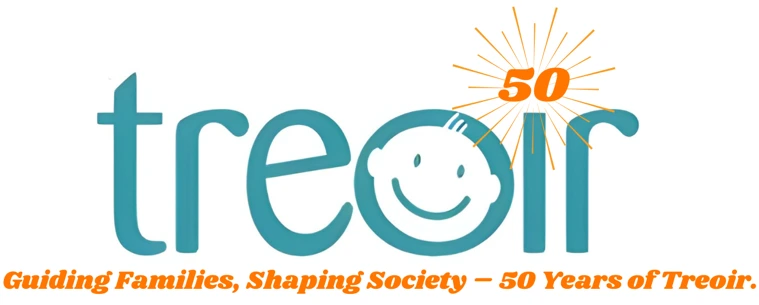
Both a spokesperson for Kinship Care Ireland and a Kinship Carer are available for media interview.
Issued by Kinship Care Ireland
Wednesday, September 27, 2023.
Call for Policy to fully recognise Kinship Care within Ireland
All Kinship Care arrangements need a policy for inclusion in social services
A call has been made to formally recognise all circumstances of Kinship Care in Ireland – and to provide a policy for essential social, welfare, and service supports.
The gap in social supports was highlighted today at a briefing in Leinster House to Oireachtas members by Kinship Care Ireland (KCI).
Kinship Care is when children are cared for by a relative or close family friend when a parent can’t. This can be for a wide range of reasons such as parental illness, imprisonment, abandonment, substance misuse, capacity, abuse, or death.
There are an estimated 10,000 children in Kinship Care in Ireland.
Addressing politicians Kinship Care Ireland Coordinator Laura Dunleavy said many of these families are invisible and access to essential legal, financial, health, educational, and emotional supports are an unacceptable challenge.
“This is a live issue, as in February 2023, the UN Committee on the Rights of the Child specifically called on the Irish Government to ‘develop a policy on the rights of children in informal Kinship Care’.
Last Spring the Minister for Children, Equality, Disability, Integration and Youth Roderic O’Gorman gave a commitment to work this year on a policy.
Ms Dunleavy said it is now time to get this work underway. She outlined two different categories of Kinship Care – and said Ireland must bring its policies into line with international standards by recognising all circumstances of Kinship Care.
“Formal Kinship Care is when there is an arrangement in place that is known to social services, such as when a relative has gone through a Foster Care Assessment and is eligible for some social supports and welfare payments.
“Informal Kinship Care is when there isn’t a formal arrangement with social services in place. And for these families in Ireland, there is no recognised pathway to financial, legal, therapeutic supports, peer support, advocacy or signposting.
“Internationally, Formal Kinship Care and Informal Kinship Care are identified as ‘Alternative Care’ – and both are formally recognised within social welfare and social support systems.
“Kinship Care Ireland is seeking full recognition and a policy for kinship care in all circumstances, particularly informal arrangements. We are seeking understanding, engagement, and support among Government TDs, opposition TDs, Senators and across all parties and Independents. We will also be continuing to engage with Minister O’Gorman.”
The specific policy asks which Kinship Care Ireland’s submission sets our include:
- Recognition of the specific circumstances of Kinship Care: Kinship Care can arise in response to a crisis, without preparation. For a child, growing up apart from a parent is an inherent trauma – and so Kinship families need specific access to therapeutic and trauma informed support in ‘parenting a child with trauma’, peer spaces, legal advice, accessible and sufficient financial support, housing support and signposting of information and resources.
- Welfare Support for all Informal Kinship Carers: Timely access for Informal Kinship Carers to welfare payment (the Guardians payment) and without delay or appeals. Families in formal Kinship Care are entitled to the Foster Carers payment. Families in informal Kinship Care can apply for the Guardian’s payment, however this requires urgent reform as processing time is lengthy, involves appeals and many applications are refused. The rate of the payment also needs to be increased to avoid poverty.
- Access to Social Care: All Kinship Carers need access to community based Social Care for the initial period of taking the role, and should have ongoing points of contact for if future challenges arise.
- Medical: Streamlined access to Medical Card and trauma recovery supports.
- Respite: The majority of Kinship Carers are grandparents and need access to respite services.
- International best practice: Ireland’s policy should adapt learning from best international models particularly those from the US, Aotearoa New Zealand, UK, Northern Ireland and Scotland.
- Data: Development of a national data system to gather and track Kinship Care.
Research both in Ireland and internationally has identified that due to the complexity of reasons that often lead to Kinship Care – many families have a disproportionate prevalence of poverty, Foetal Alcohol Spectrum Disorders, trauma, bereavement and separation, mental health illness, substance misuse and hidden harm.
The presentation was also attended by the founder of the organisation Caitríona Nic Mhuiris who became Kinship Carer to her four nieces following the death of their parents. Her family’s experience of trying to identify and navigate support systems persuaded her of the need for an organisation to specifically support and advocate for Kinship Care.
‘Kinship families are an invisible family type and need to be valued for the important role they play in keeping children from going into State care and saving the State millions of euros. Kinship carers are mainly older grandparents, and many are in poor health. Without adequate support kinship carers are worried they may have to give up the care of the children. Investing in supports for Kinship Care will enable kinship families to thrive and reach their full potential.”
Further Information
Ronan Cavanagh, Cavanagh Communications: (086) 317 9731.
Kinship Care Ireland
Kinship Care Ireland (KCI) is the only representative and support group working in this area in Ireland and is committed to providing leadership in the recognition, rights, and social supports for Kinship Care families. Kinship Care Ireland is hosted within the not-for-profit charity Treoir, the National Federation for Non-Marital Families. www.kinshipcare.ie / info@kinshipcare.ie / 087 148 7124.
